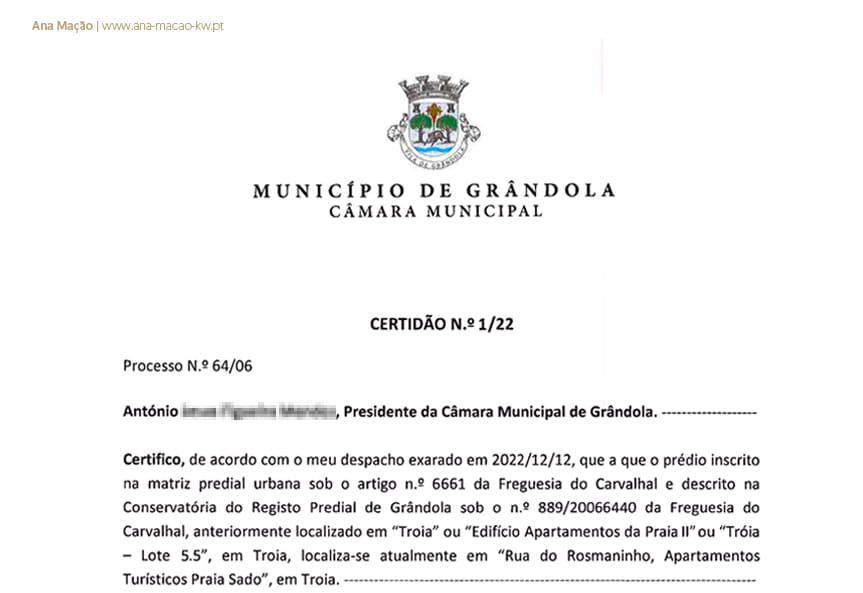Toponymic Certificate
In this article, I will explore what the Toponymic Certificate document means, why it is so important for the real estate sector, owners and buyers, what it is for, how to obtain one, how much it costs and the associated deadlines.
Index
- Toponymic Certificate: what is it?
- Toponymic Certificate: what is it for?
- Who should request a Toponymic Certificate from ?
- Who can request this certificate?
- How do I request a Toponymy Certificate?
- How much does a Toponymy Certificate cost ?
- What is the deadline for issuing a Toponymy Certificate?
- Legislation applicable to the Toponymy Certificate
- Frequently asked questions about the Toponymy Certificate
(Top▲) Toponymic Certificate: what is it?
The Toponymic Certificate consists of an official document issued and authenticated by the City Council, which certifies the toponymy, numbering of building(s) and/or the parish of the property in question , as well as any correspondence between the current elements and previous elements, verified in the local or registered with official entities.
The content of a toponymic certificate varies depending on the municipality, but generally includes the following elements:
Mandatory elements:
- Toponymy (name of street, avenue, etc.)
- Building number (police number)
- Parish
Optional elements:
- Postal Code
- Location of the building’s georeferencing
- Plan of the parish with the location of the building
- Previous street names and building numbering
Here is an example of a Toponymic Certificate:
(Top▲) Toponymic Certificate: what is it for?
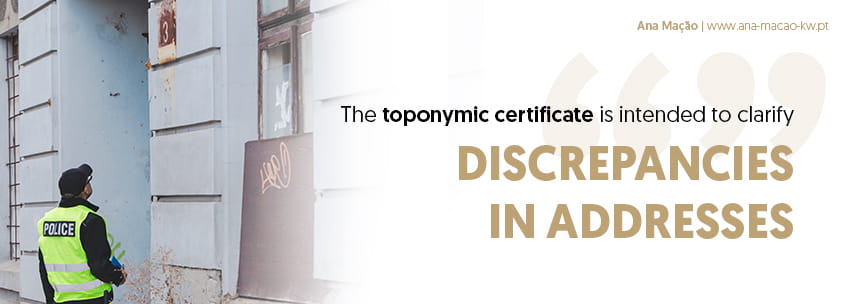
The toponymic certificate is a key piece for several situations, the following being noteworthy:
- Purchase and sale of properties: The updated Toponymic Certificate is essential for carrying out the public deed when purchasing or selling a property, especially if there is a non-conformity in the address of a property in the necessary documents (Land Booklet and Permanent Certificate of the Land Registry ) for the deed and registration of the purchase and sale of a property (as well as other situations). It confirms the official toponymy (street name, police number, and parish) of the property, ensuring that everything is correct in legal terms. Without this document, especially if the property is located in a recent subdivision, many notary offices (starting with the public ones) will not accept a purchase and sale deed without the Toponymic Certificate.
- Proof of address: For example, if you want to open a bank account , some banks may ask for a toponymic certificate to confirm your address, in case any doubts arise. It is an additional guarantee for the security of financial transactions and an important step against fraud.
- Registration changes: If there has been any change in the name of the street, the building number or the parish of the property, updating the toponymic certificate is essential. For example, in recently built subdivisions, it is common for the street name or house number to change during the development phase. For example Rua A, Lot 45 in the initial phase of the subdivision for Rua Álvaro de Campos, Nº 52, after the completion of this phase.
- Obtaining licenses and authorizations: It is normal that some municipal and public services may require a Toponymic Certificate in order to respond to certain processes: construction licenses, updating vehicle registration, commercial registration, etc.
- For legal issues: In legal processes, such as adverse possession or inventories, the toponymic certificate can be a key document.
- To hire services: The toponymic certificate can be requested by service companies such as supplying water, electricity, gas, internet, etc., to confirm the customer's address.
In short, the toponymic certificate is official proof of the location of a property. Keep it updated if there are changes to the street name, house number or parish, so you are always prepared for any eventuality.
(Top▲) Who should request a Toponymic Certificate from?

You must request the issuance of the certificate from the municipal services of the municipality to which the property belongs, which can issue this document. In most municipalities, the Toponymic Certificate request can be made in one of the following ways:
- In person: going to the City Council services desk;
- By mail: By letter addressed to the President of the City Council, or to the Councilor of the Department of Toponímia / Urbanism / Cultural Heritage, etc.;
- Via the internet: If the Chamber has this modality accessible, on its website, by filling out the online form;
- By email: By sending a mail message to the appropriate email address, normally referenced on the municipality's website;
(Top▲) Who can request this certificate?
The legitimate owner(s) of the property of the rustic, urban building or fraction. Or, if you are a tenant and need the certificate for the purpose of changing your address.
In case of impossibility, or absence from the country, you can always ask for help from third parties, if they are accompanied by a power of attorney in your name
(Top▲) How to request a Toponymy Certificate?
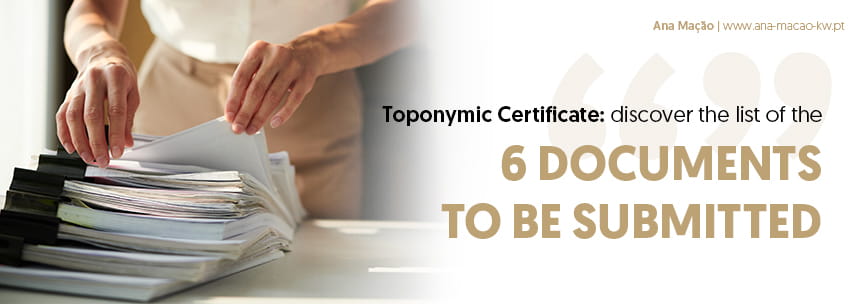
To request a certificate relating to the location of a property, you must proceed through one of the routes described above (if available) and submit the request together with the following documents:
- Applicant identification (and family members);
- Valid copy of the Land Registry Certificate from the Land Registry Office;
- Copy of the Urban Property Tax Document;
- Location and site plan with detail (recommended 1/2000);
- Horizontal property (when constituted);
- Lease contract (if the applicant is a tenant and needs the certificate for address change purposes);
(Top▲)How much does a Toponymy Certificate cost?
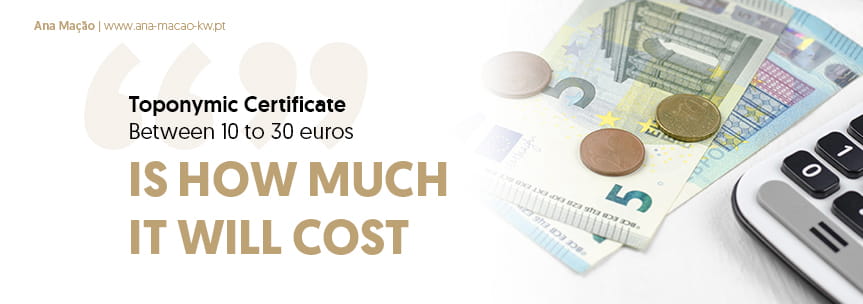
When toponymic changes are involved at the initiative of the City Council that are beyond the control of the applicant (e.g. street name), the issuance of the Toponymic Certificate is free of charge.
Otherwise, the cost depends from municipality to municipality, as in the case of a Municipal Tax its value may vary. If the issuance of the certificate does not require an in-person visit to the property's location, the value may vary between €10 and €20. When the issuance of the certificate requires a visit to the location, for reasons attributable to the applicant, it is normal for this amount to be subject to an extra fee, which in the case of some councils can be around €30.
If you wish to receive the certificate by post, there is normally a small extra charge to cover registered mail costs.
(Top▲) What is the deadline for issuing a Toponymy Certificate?
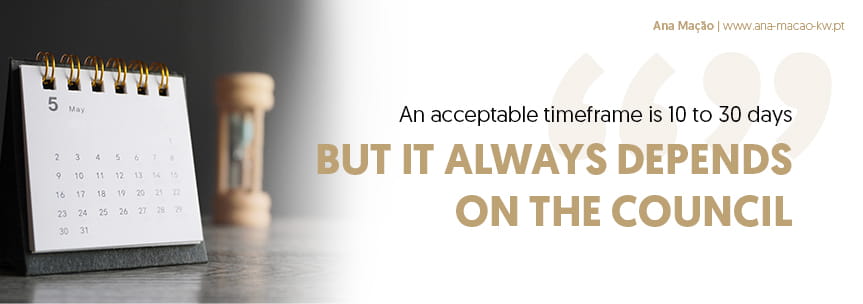
The deadline for issuing the certificate depends largely on the services of each chamber, but an acceptable deadline can vary between 10 days and 30 days . E.g. in Porto city hall it takes 10 working days. There is usually an emergency service that reduces this period (e.g. 3 working days), against payment of an Emergency Surcharge.
(Top▲) Legislation applicable to the Toponymy Certificate
Although there is no specific legislation that deals exclusively with this document, in Portugal, the Toponymic Certificate is supported by several legal norms that govern territorial planning, property registration and the geographic identification of properties. The main legislative references that, directly or indirectly , related to the Toponymic Certificate include:
- Municipal regulations: Regulate local specificities such as the naming of roads and the numbering of buildings, which are essential for issuing Toponymic Certificates.
- Land Registry Code: Defines the rules for property registration, where the certificate is essential to confirm the location of properties.
- Notary Code: Describes notarial procedures, including the purchase and sale of properties, situations in which the toponymic certificate is often requested.
- Local Finance Law and municipal regulations: Address the nomenclature of public roads, essential for issuing the Toponymic Certificate.
- Legal Regime for Urbanization and Building (RJUE): Establishes the rules for urbanization and construction, implying the need for a certificate for the exact identification of land.
- Legislation on the National Geographic Information System (SNIG): Influences the management of geographic information, including toponymy.
If you want more detailed information, I recommend consulting a legal specialist (notary or solicitor), or directly contacting the City Council or the Portuguese Geographic Institute, entities that can provide updated guidance on the rules applicable to the Toponymic Certificate.
(Top▲) Frequently asked questions about the Toponymy Certificate
These are some of the most frequently asked questions about Toponymic Certificate in Portugal:
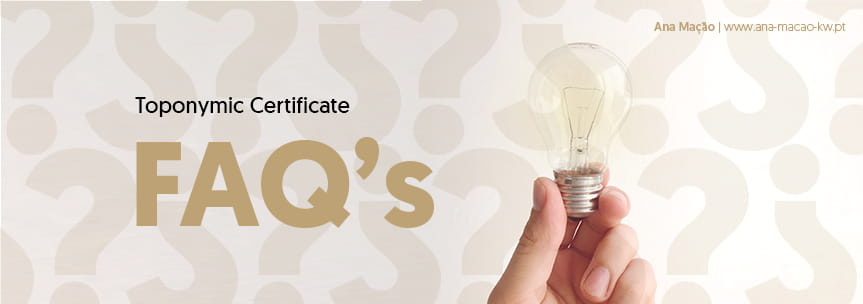
What is the Toponymic Certificate and what is its importance in the real estate sector?
The Toponymic Certificate is an official document issued by the City Council of the area where the property is located, which attests to the official name of the street or avenue where it is located. It is important in the real estate sector, as the name of the street or avenue can have an impact on legal issues and real estate transactions in general.
How to request a Toponymic Certificate in Portugal?
The Toponymic Certificate can be requested by the property owner or their legal representative, from the City Council of the area where the property is located. It is necessary to present some documents, such as the property title and a copy of the citizen card or identity card of the owner or his legal representative.
How long does it take to obtain the Toponymic Certificate in Portugal?
The deadline for issuing the Toponymic Certificate may vary from City Council to City Council, but generally only takes a few working days. For example, in Porto City Council, on average, it takes 10 days.
What is the cost of applying for a Toponymy Certificate?
If changing the name of the street is a decision of the Council, you do not pay anything for the Toponymic Certificate. The price varies from camera to camera, between €10 and €20, if it is not necessary for a technician to travel to the location of the property. If necessary, there may be an extra cost of around €30. If you want to receive it by post, a small fee will be added for registered shipping.
Is the Toponymic Certificate mandatory in all real estate transactions in Portugal?
No, the Toponymic Certificate is not mandatory in all real estate transactions in Portugal. However, it is recommended to have it up to date to avoid legal or bureaucratic problems, in case there is any discrepancy in the property address in the official documents (Land Booklet, Permanent Land Registry Certificate, etc.)
Is it necessary to update the Toponymic Certificate in case of changing the name of the street or avenue where the property is located?
Yes, it is necessary to update the Toponymic Certificate in case of changing the name of the street or avenue where the property is located, to avoid legal or bureaucratic problems.
What is the validity period of the Toponymic Certificate in Portugal?
There is no defined validity period for the Toponymic Certificate in Portugal. However, it is recommended to keep it updated and request a new Toponymic Certificate in case of changing the name of the street or avenue where the property is located.
Important Note: The information in this glossary is for informational purposes only. For proper advice on legal or tax matters, consultation with a duly authorized lawyer, notary, solicitor, or accountant is essential.
Your next step in the real estate market
Whether you want to sell your property for the maximum value or find the ideal home, count on my experience as a Top Producer consultant at KW Portugal. Talk to me without obligation. Start today with a simple contact.
Contact Me Today
Related articles



